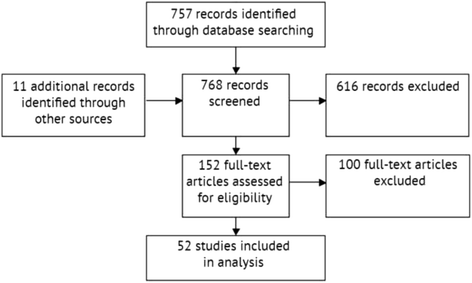Use of malaria RDTs in various health contexts across sub-Saharan Africa: a systematic review
- PMID: 28521798
- PMCID: PMC5437623
- DOI: 10.1186/s12889-017-4398-1
Use of malaria RDTs in various health contexts across sub-Saharan Africa: a systematic review
Abstract
Background: The World Health Organization recommends parasitological confirmation of malaria prior to treatment. Malaria rapid diagnostic tests (RDTs) represent one diagnostic method that is used in a variety of contexts to overcome limitations of other diagnostic techniques. Malaria RDTs increase the availability and feasibility of accurate diagnosis and may result in improved quality of care. Though RDTs are used in a variety of contexts, no studies have compared how well or effectively RDTs are used across these contexts. This review assesses the diagnostic use of RDTs in four different contexts: health facilities, the community, drug shops and schools.
Methods: A comprehensive search of the Pubmed database was conducted to evaluate RDT execution, test accuracy, or adherence to test results in sub-Saharan Africa. Original RDT and Plasmodium falciparum focused studies conducted in formal health care facilities, drug shops, schools, or by CHWs between the year 2000 and December 2016 were included. Studies were excluded if they were conducted exclusively in a research laboratory setting, where staff from the study team conducted RDTs, or in settings outside of sub-Saharan Africa.
Results: The literature search identified 757 reports. A total of 52 studies were included in the analysis. Overall, RDTs were performed safely and effectively by community health workers provided they receive proper training. Analogous information was largely absent for formal health care workers. Tests were generally accurate across contexts, except for in drug shops where lower specificities were observed. Adherence to RDT results was higher among drug shop vendors and community health workers, while adherence was more variable among formal health care workers, most notably with negative test results.
Conclusions: Malaria RDTs are generally used well, though compliance with test results is variable - especially in the formal health care sector. If low adherence rates are extrapolated, thousands of patients may be incorrectly diagnosed and receive inappropriate treatment resulting in a low quality of care and unnecessary drug use. Multidisciplinary research should continue to explore determinants of good RDT use, and seek to better understand how to support and sustain the correct use of this diagnostic tool.
Keywords: CHW; Drug shop; Health facility; Malaria; Plasmodium falciparum; RDT; Retail sector; School; Sub-Saharan Africa.
Figures
References
-
- World Health Organization (WHO) World malaria report. Geneva: WHO; 2015.
-
- World Health Organization (WHO) Guidelines for the treatment of malaria. Geneva: WHO; 2006.
-
- World Health Organization (WHO) Guidelines for the treatment of malaria. 2. Geneva: WHO; 2010. - PubMed
Publication types
MeSH terms
Grants and funding
LinkOut - more resources
Full Text Sources
Other Literature Sources
Medical



